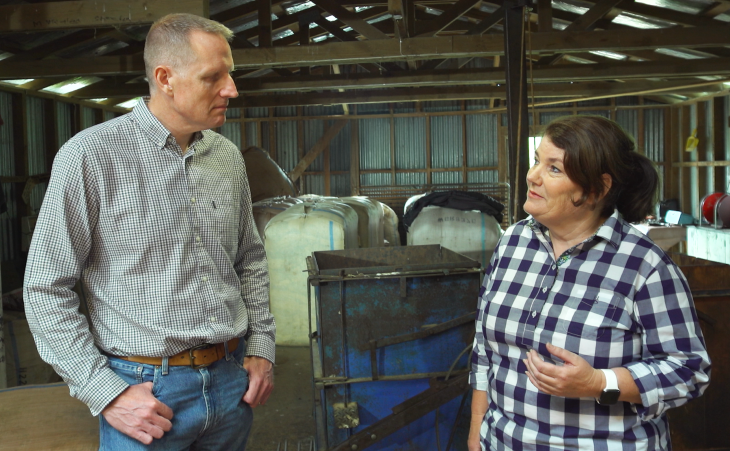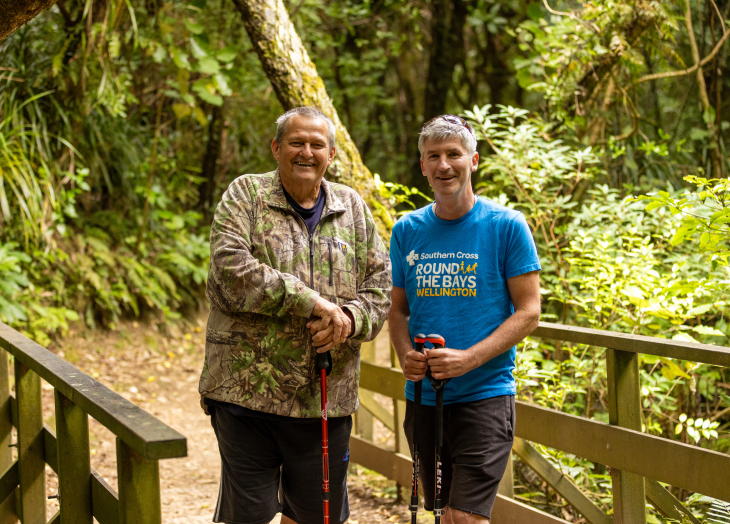George’s story: Lifelong consequence for one mistake
Five years ago, George Thompson suffered a life-changing injury on his farm. He’s defied the odds to walk again and is pleased to see ACC partner with Safer Farms to help prevent others going through the same ordeal.
Farmer George Thompson will never forget Valentine’s Day – but for all the wrong reasons.
On 14 February 2020, the Levin farmer wasn’t meant to be working but one of his team called in sick, so his alarm went off at 4.30am and he was straight into his work on the rolling terrain.
He was managing a 450-cow herd and had been working on the same farm for 23 years.
George was tired from a big week. He was driving his quad bike when something distracted him in his peripheral vision. He later learned it was a cow upside down in a drain.
One moment of distraction was all it took for the then 63-year-old to drive his quad bike headfirst into the drain.
“It all happened so quickly,” George says.
“I remember standing up and thinking, ‘Man, that hurt.’ Next thing, my legs just gave way on me.
“I slid down into the drain and I had all these tingling feelings in my fingers – I knew I was in trouble.”
George managed to get his phone out of his top pocket and swiped the last person he’d rung the night before, his colleague Darryl Ryan. Darryl knew exactly where he was, and he called an ambulance and George’s wife, Jane.
George, a farmer of 38 years, was lying in the drain and holding his neck in place as he waited for help.
Around an hour later, three ambulances, the fire brigade and a helicopter arrived at the scene to get him to Wellington Hospital for emergency surgery.
Known for his dry sense of humour, George was true to form when he saw Jane, saying “Happy Valentines Day honey.”
“She came rushing down and called me a bloody idiot,” he says with a laugh.
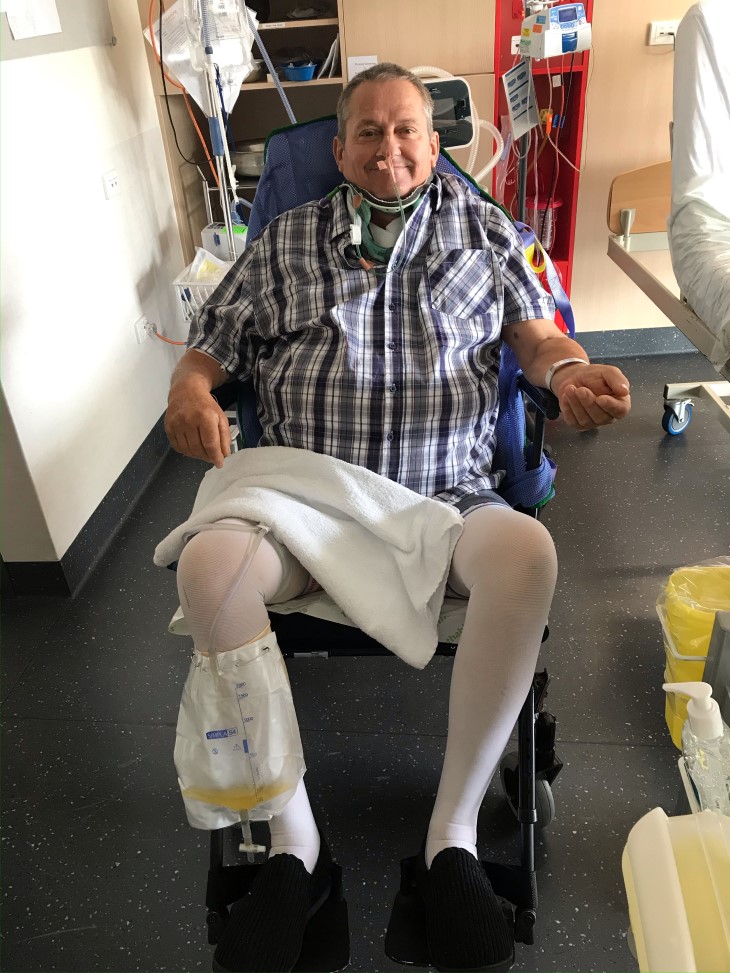
The long road to recovery begins
George spent a few days in Wellington Hospital. His worst fears were confirmed when he was told he’d fractured his neck and damaged his spinal cord.
He was given a 20 per cent chance of walking again. His long road to recovery began with six months at the Burwood Spinal Unit in Christchurch.
“It was hard to get my head around it all,” he says. “One minute, I was on my farm and loving my life in my dream job and the next I was in the spinal unit and not sure what the future held.”
But George never let that get him down. He says the other patients in the spinal unit gave him perspective.
“I would say to my psychiatrist, ‘Listen, I’ve got nothing to complain about because next door is another patient, Mr Pickles, who’s paralysed from the neck down and has it much tougher than me.’”
George set about achieving his goal of walking out of the Burwood Spinal Unit. He says the laughter and banter with other patients got him through the hardest time in his life.
“When they gave me a 20 per cent chance of walking, I just took that with both arms,” he says.
George was determined to prove them wrong. He met with his physio at Burwood and they formed a great partnership.
“I remember she gave me a sheet of paper and all it had written on it was ‘Can’t’. I asked what that meant and she said, ‘It’s the only word I don’t accept.’”
It was slow progress but George achieved his goal of walking out of the unit, which was an emotional moment.
He says ACC has been a huge support in every step of his rehabilitation.
“I can’t complain about anything,” he says.
“Everyone I’ve dealt with has been marvellous and I’m grateful for everything they’ve done for me.”
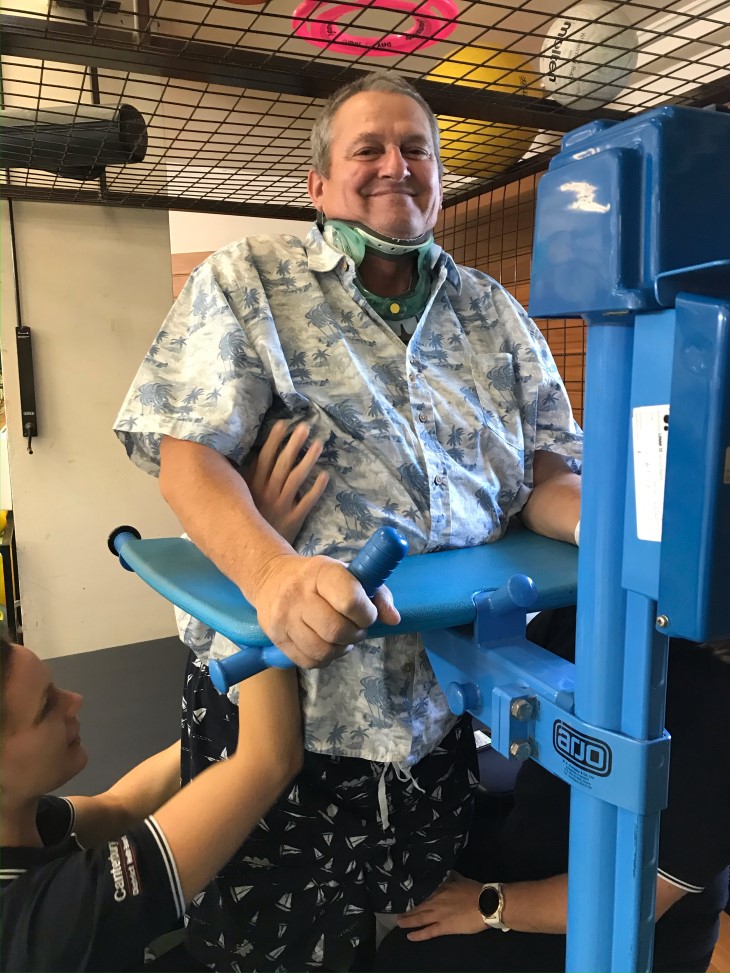
‘Get off the farm and give yourself a break’
George has made huge strides since getting back on his feet.
Last year, he and Andrew Leslie, who he met during his time in the spinal unit, walked the Abel Tasman National Park together and this year he and his wife are planning a trip to Europe.
George still works part-time as a farmer, caretaking for farmers so they can have a break. He has great advice for anyone in the industry.
“It’s the best job in the world but you have to look after yourself,” he says.
“Make sure you have the right people to support you on the farm and watch out for signs of stress and fatigue. I made a simple mistake because I was tired and wasn’t thinking clearly.
“Don’t take life so seriously. You have got to get off the farm and give yourself that break. It’s so important for you, physically and mentally.”
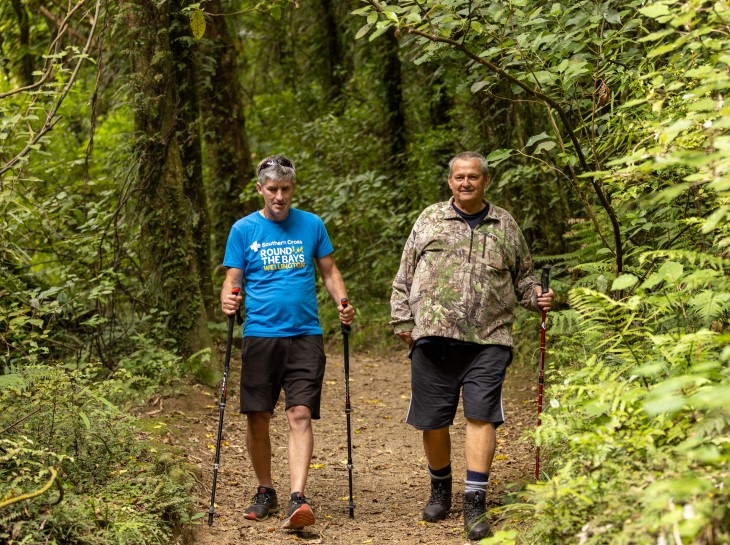
George Thompson, right, with his good friend Andrew Leslie.
ACC partners with Safer Farms
Last year, we accepted 23,440 farming-related injury claims at a cost of $120 million to help people recover. This was the highest number of claims since 2021 and the highest cost in the past five years.
That’s why ACC and Safer Farms have announced a new partnership to reduce harm, injuries and fatalities in the agriculture sector.
The partnership will see over $11 million invested by ACC over the next five years, supporting the agriculture sector in the implementation of Safer Farms’ innovative grassroots ‘Farm Without Harm’ strategy.
“We’re committed to driving positive, enduring change for New Zealand’s agricultural sector and we believe Safer Farms is key to supporting that commitment,” says Andy Milne, ACC Deputy Chief Executive Strategy, Engagement and Prevention.
Andy says we’re focused on supporting the agriculture sector in ways that are practical, impactful and sustainable.
“That’s great to see,” George says.
“The farm is a dangerous environment. But our young farmers come in and, after a few months, they think they know it all.
“They need that guidance and experience around them to support their decision making. The more we can do to promote safety on the farm in a practical way, the better.
“My story shows one mistake can have a lifelong consequence.”

ACC and Safer Farms
The key focus areas in the action plan are:
- Psychosocial risks resulting in diminished wellbeing
- Harm experienced while working in and around vehicles and mobile plant
- Muscular stress and injury caused by livestock handling
- Harm caused by exposure to agricultural chemicals and airborne risks
More information is available on the Farm Without Harm website.



